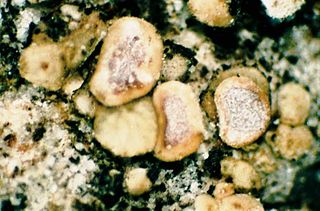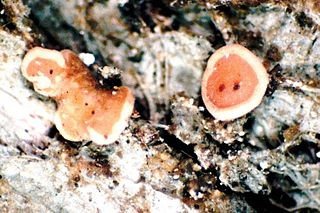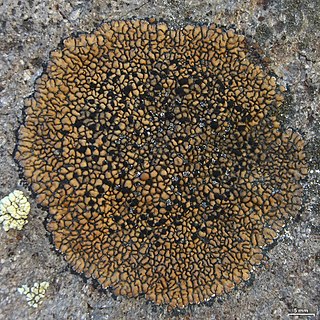The Dactylosporaceae are a family of lichen-forming fungi in the order Lecanorales.

The Sphaerophoraceae are a family of lichenized fungi in the order Lecanorales. Species of this family have a widespread distribution, especially in southern temperate regions. Sphaerophoraceae was circumscribed by mycologist Elias Magnus Fries in 1831.

The Acarosporales are an order of fungi in the class Lecanoromycetes. Phylogenetic analyses conducted using the sequences of both the protein-coding gene RPB2 as well as nuclear ribosomal genes place this order within the subclass Acarosporomycetidae.

The Ostropales are an order of fungi in the class Lecanoromycetes. The order was circumscribed by Swedish botanist John Axel Nannfeldt in 1932. The order contains 4 families and 46 genera, including 6 genera of uncertain familial placement.

Coenogoniaceae is a family of fungi in the order Gyalectales. It consists of the single genus Coenogonium, which has an estimated 91 species.

The Gyalectaceae are a family of fungi in the order Gyalectales.
Rhizomucor is a genus of fungi in the family Lichtheimiaceae. The widespread genus contains six species. Rhizomucor parasiticus, the species originally selected as the type, is now considered synonymous with Rhizomucor pusillus.
Lignoscripta is a genus of lichenized fungi in the family Trapeliaceae. This is a monotypic genus, containing the single species Lignoscripta atroalba.

Glyphis is a genus of lichenized fungi in the family Graphidaceae. The genus has a widespread distribution, especially in tropical regions.
Anomalographis is a genus of two species of lichenized fungi in the family Graphidaceae.

Anaptychia is a genus of lichenized fungi in the family Physciaceae.
Cryptodiscus is a genus of fungi in the family Stictidaceae. It contains 9 species.
Petractis is a genus of fungi of uncertain placement in the Lecanoromycetes.
Homothecium is a genus of lichen-forming fungi in the family Pannariaceae.

The Ophioparmaceae are a small family of lichen-forming fungi in the order Umbilicariales. The family was circumscribed in 1988 by lichenologists Roderick Westgarth Rogers and H. Thorsten Lumbsch.
The Arctomiaceae are a family of lichenized fungi in the Ascomycota, class Baeomycetales. The family was named by Theodor Magnus Fries in 1861. Species in this family are found in arctic and subarctic habitats, usually associated with bryophytes.
The Cystobasidiomycetes are class of fungi in the subdivision Pucciniomycotina of the Basidiomycota. The class contains six orders: Buckleyzymales, Cyphobasidiales, Cystobasidiales, Erythrobasidiales, Naohideales, and Sakaguchiales.

The Lecideales are an order of lichenized fungi in the class Lecanoromycetes. The order contains two families: the Lecideaceae, which contains 29 genera and about 260 species, and Lopadiaceae, which contains the single genus Lopadium of 10 species.

Caliciales is an order of mostly lichenized fungi in the class Lecanoromycetes. It consists of two families: Caliciaceae and Physciaceae, which together contain 54 genera and more than 1200 species. The order was circumscribed by American botanist Charles Edwin Bessey in 1907.

Ovicuculispora is a genus of lichenicolous fungi in the family Bionectriaceae. The genus was circumscribed by Javier Etayo in 2010, with O. parmeliae assigned as the type species. This species had formerly been placed in the genera Nectria in 1981, and later (2001) in Nectriopsis.










